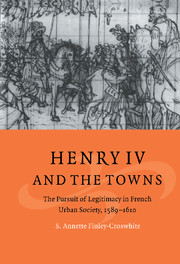Book contents
- Frontmatter
- Contents
- List of illustrations
- List of tables
- Acknowledgements
- Introduction
- 1 France in the 1580s and 1590s
- 2 Brokering clemency in 1594: the case of Amiens
- 3 Henry IV's ceremonial entries: the remaking of a king
- 4 Henry IV and municipal franchises in Catholic League towns
- 5 Henry IV and municipal franchises in royalist and Protestant towns
- 6 Clientage and clemency: the making of municipal officials
- 7 Urban protest in Poitiers and Limoges: the pancarte riots
- 8 Municipal finance and debt: the case of Lyons
- Conclusion: Henry IV, urban autonomy, and French absolutism
- Bibliography
- Index
- CAMBRIDGE STUDIES IN EARLY MODERN HISTORY
Conclusion: Henry IV, urban autonomy, and French absolutism
Published online by Cambridge University Press: 02 November 2009
- Frontmatter
- Contents
- List of illustrations
- List of tables
- Acknowledgements
- Introduction
- 1 France in the 1580s and 1590s
- 2 Brokering clemency in 1594: the case of Amiens
- 3 Henry IV's ceremonial entries: the remaking of a king
- 4 Henry IV and municipal franchises in Catholic League towns
- 5 Henry IV and municipal franchises in royalist and Protestant towns
- 6 Clientage and clemency: the making of municipal officials
- 7 Urban protest in Poitiers and Limoges: the pancarte riots
- 8 Municipal finance and debt: the case of Lyons
- Conclusion: Henry IV, urban autonomy, and French absolutism
- Bibliography
- Index
- CAMBRIDGE STUDIES IN EARLY MODERN HISTORY
Summary
This study of Henry IV and the towns adds another dimension to the growing body of revisionary literature questioning the meaning of the term ‘absolutism’ in the early modern historical context. It has been shown that the king's most overt attacks on a few towns did not mean that he harboured designs to emasculate urban governments. Henry sometimes intervened in elections and reduced the size of town councils. He overrode medieval exemptions and taxed the towns. He forced discontent town-dwellers to accept the Edict of Nantes as well as his post-war debt amortization plan. But these actions must be weighed against his attempts to work with the towns, reward them, and bring their elites into his royal clientele. The French Wars of Religion were in large part a major urban conflict, and the end of the wars brought about a resolution in the Crown's struggle with the towns, if only temporarily. Even so, Henry's relationship with the towns was complex and contradictory. The towns may have resisted any blatant movement towards more authoritative rule on his part while still depending on him to act as a problem-solver in matters related to debt, riot, factional politics, and national security, the very issues that necessitated the king's interference in town politics.
If the wars stimulated a revival of urban autonomy, they also prevented towns from being able to establish permanent security for their inhabitants. The Catholic League, in particular, had promised harmony and neighbourliness reinforcing a sixteenth-century ideal of urban solidarity. But instability resulted as League promises failed to materialize and Guisard largess declined causing town populations to grow divided. Religious sentiment could not insulate France from its own centrifugal forces.
- Type
- Chapter
- Information
- Henry IV and the TownsThe Pursuit of Legitimacy in French Urban Society, 1589–1610, pp. 182 - 186Publisher: Cambridge University PressPrint publication year: 1999



